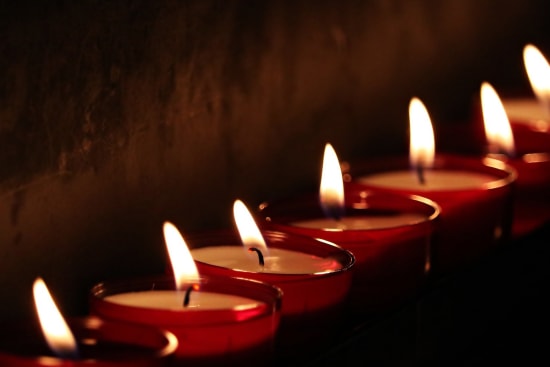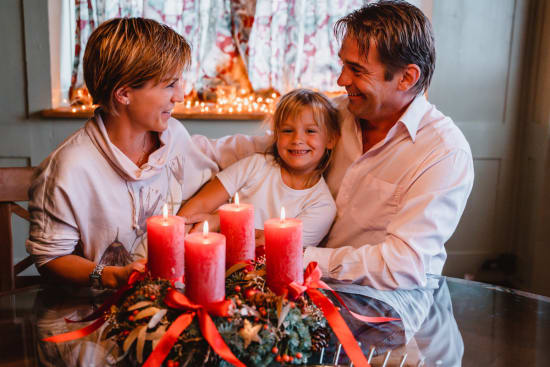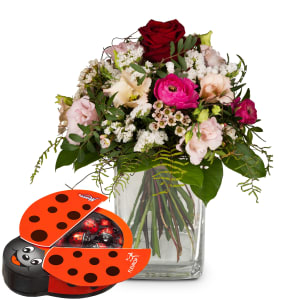November / December
Whether singles and men, Black Friday and Cyber Monday,
Advent, Christmas and New Year's Eve: here you'll find out what there is to celebrate in the last two months of the year.

All Saints' Day: 1 November (fixed date)
All Saints' Day is an important festival of the Roman Catholic and Anglican churches and is only known as a public holiday in Switzerland in the
predominantly Catholic cantons. All Saints' Day should really be a day of remembrance for the saints. But since November 2nd is
All Souls' Day and this is not considered to be a day off, one visits the cemetery on All Saints' Day and decorates the graves of relatives and friends.

Singles' Day: 11 November (fixed date)
Singles' Day was founded in 1993 by Chinese students. They chose the date because it consists of four ones and the number 1 symbolizes a single.
Goal of the day? Quite sympathetic. Because on the one hand you can - according to the students -
also be happy as a single (you are free, nobody complains ...), on the other hand you can use the day to put an end to being a single.
Flowers? Suitable as a flirt attempt, for a first dating and to be happy with singles about their independence. Last but not least, the number 1 is also used in the sense of "the only one". And so you can tell your sweetheart through flowers: «You are the only one for me».
Do something good for yourself? Go HERE to FleuropHOME.
Flowers? Suitable as a flirt attempt, for a first dating and to be happy with singles about their independence. Last but not least, the number 1 is also used in the sense of "the only one". And so you can tell your sweetheart through flowers: «You are the only one for me».
Do something good for yourself? Go HERE to FleuropHOME.

International Men's Day: 19 November (fixed date)
The International Men's Day is all about highlighting the importance of men and boys and honoring their social or community involvement.
In other words, ladies: Today husbands, friends and colleagues are in the foreground for once.
Show them that you value and appreciate them. Perhaps with one of our funny plants for men. On www.maennerpflanze.ch you will find the entire assortment.
Show them that you value and appreciate them. Perhaps with one of our funny plants for men. On www.maennerpflanze.ch you will find the entire assortment.

Black Friday: Friday after Thanksgiving (between 23 and 29.11.)
The Black Friday is from the USA. It takes place on the Friday after Thanksgiving, which is celebrated on the fourth Thursday of November.
Black Friday is considered the beginning of the Christmas shopping season. It is a retail sales event that focuses on discounts and is designed
to encourage shoppers to buy Christmas gifts not at the last minute. In Switzerland, Black Friday exists since 2015 and has become very popular.
There are many theories about the reason for the name.
One of them is that this day represents the point in the year when retailers begin to turn a profit, thus going from being «in the red» to being «in the black».
Since the Cyber Monday takes place on the following Monday, Fleurop occasionally turns Black Friday into a «Black Friday Weekend» and extends the attractive special offers until Cyber Monday. As these are only communicated via newsletter, it is best to register immediately to benefit from them as well.
Register for the newsletter.
Since the Cyber Monday takes place on the following Monday, Fleurop occasionally turns Black Friday into a «Black Friday Weekend» and extends the attractive special offers until Cyber Monday. As these are only communicated via newsletter, it is best to register immediately to benefit from them as well.
Register for the newsletter.

Cyber Monday: Monday after Thanksgiving (between 26.11. and 2.12.)
Cyber Monday marks the start of Christmas sales by online shops. It always takes place on the Monday after Thanksgiving,
which is celebrated on the fourth Thursday of November.
It is a sales event of online commerce that focuses on discounts and is intended to encourage people to buy Christmas gifts not at the last minute.
Since the previous Friday is Black Friday, Fleurop occasionally turns Black Friday into a «Black Friday Weekend» and extends its attractive special offers until Cyber Monday. As these are only communicated via newsletter, it is best to register immediately to benefit from them as well.
Register for the newsletter.
Since the previous Friday is Black Friday, Fleurop occasionally turns Black Friday into a «Black Friday Weekend» and extends its attractive special offers until Cyber Monday. As these are only communicated via newsletter, it is best to register immediately to benefit from them as well.
Register for the newsletter.

First day of Advent: 4th Sunday before 25 December
For many, the atmospheric Advent with its many lights and decorations is the most beautiful time of the year.
This is why they not only decorate their own homes, but also give wreaths, flowers and candles to friends and family members.
The word Advent is of Latin origin.
It means arrival and refers to the birth of Jesus Christ in Bethlehem.
Today Advent lasts four weeks. But earlier in the Eastern churches it lasted from 11 November to 6 January, while the West's ended on 25 December. By the way: if you work out the date of the first Sunday in Advent using the calendar, you CAN'T count 25 December if it falls on a Sunday.
More about this day can be found HERE.
Today Advent lasts four weeks. But earlier in the Eastern churches it lasted from 11 November to 6 January, while the West's ended on 25 December. By the way: if you work out the date of the first Sunday in Advent using the calendar, you CAN'T count 25 December if it falls on a Sunday.
More about this day can be found HERE.

St Nicholas' Day: 6 December (fixed date)
Santa Claus makes his big appearance on 6 December in some countries, and puts stars in children's eyes with apples, mandarins and nuts.
This custom goes back to St Nicholas, who was Bishop of Myra. He was revered because he was said to have performed many miraculous deeds.
From this the present-day custom of Santa Claus developed.
At first, the old man kept his bishop's robes almost everywhere. But from the mid-19th century onwards he appeared in a red-brown coat and pointed hat.
The poem «The night before Christmas» had the greatest influence on Santa Claus as we know today, by describing him as a plump, jolly elf dressed in a red and white robe, with twinkling eyes, rosy cheeks and a long snow-white beard. Today Santa Claus also gives presents to «older» children.
Find out more about Advent and Christmas HERE.
The poem «The night before Christmas» had the greatest influence on Santa Claus as we know today, by describing him as a plump, jolly elf dressed in a red and white robe, with twinkling eyes, rosy cheeks and a long snow-white beard. Today Santa Claus also gives presents to «older» children.
Find out more about Advent and Christmas HERE.

Poinsettia Day: 12 December (fixed date)
People have celebrated «Poinsettia Day» in the USA for more than 150 years and surprise their loved ones on that day with a plant that is more symbolic
of Christmas than any other. This day goes back to Joel Poinsett. When Poinsett went to Mexico as the first US ambassador in 1828 and saw the poinsettia there,
he was so enthusiastic that he took it home with him to the USA, whence it has spread to large areas of the world.
In honour of the diplomat and plant lover, the US Congress introduced Poinsettia Day in the middle of the 19th century. The poinsettia is one of the most popular plants in Advent.
Find out more about the poinsettia HERE
.
In honour of the diplomat and plant lover, the US Congress introduced Poinsettia Day in the middle of the 19th century. The poinsettia is one of the most popular plants in Advent.
Find out more about the poinsettia HERE

Christmas: 25 December (fixed date)
The date of Christmas goes back to the winter solstice, which - according to the Julian calendar - took place on 25 December.
This is why the Ancient Romans celebrated the birthday of their sun god Sol Invictus on this magical day from 274 AD,
while the Christian holiday is not documented until 336 AD.
When the Protestant reformers came along, however, they remembered the origin of the date and believed that the festival of Christmas also sprang from pagan custom. They therefore renounced it. It went so far that it was actually banned in Geneva and Scotland in the 16th century. A ban on the Christmas festival was also pronounced in England in 1647. Then, however, Christians of all denominations accepted it. And the European Protestants actually took to it so much that they introduced the Advent wreath and the Christmas tree. These were initially considered to be Protestant things and were only adopted gradually by the Catholics.
More about this day can be found HERE.
When the Protestant reformers came along, however, they remembered the origin of the date and believed that the festival of Christmas also sprang from pagan custom. They therefore renounced it. It went so far that it was actually banned in Geneva and Scotland in the 16th century. A ban on the Christmas festival was also pronounced in England in 1647. Then, however, Christians of all denominations accepted it. And the European Protestants actually took to it so much that they introduced the Advent wreath and the Christmas tree. These were initially considered to be Protestant things and were only adopted gradually by the Catholics.
More about this day can be found HERE.

New Year's Eve: 31 December (fixed date)
In some European languages, 31 December is not known as New Year's Eve but by a variant of the name of Pope Sylvester I,
because it is the anniversary of his death according to the Roman Catholic calendar of saints.
The last day of the year is known as Silvester in German, Réveillon de la Saint-Sylvestre in French, Notte di San Silvestro in Italian, Silvesteravond in Dutch, Sylwester in Polish, Silvester in Slovakian, Silvestr in Czech and Szilveszter in Hungarian. Other languages know it as «Old Year's Eve», of course as a translated term.
More about this day can be found HERE.
The last day of the year is known as Silvester in German, Réveillon de la Saint-Sylvestre in French, Notte di San Silvestro in Italian, Silvesteravond in Dutch, Sylwester in Polish, Silvester in Slovakian, Silvestr in Czech and Szilveszter in Hungarian. Other languages know it as «Old Year's Eve», of course as a translated term.
More about this day can be found HERE.
More exciting flower days
January / February
These two months are beautiful. Because they are dedicated to new beginnings and to love. Learn more about the arrival of the new year, National Hug Day and Valentine's Day.
March / April
In March and April, you have good reasons to surprise power women and siblings celebrate the beginning of spring or play Easter bunny. Find out more.
May / June
May and June are months in which one spoils mothers and fathers, but also helpful neighbors. In addition, red roses are given away worldwide. We reveal the background here.
July / August
Flowers for Kissing Day? Just Because Day? Or Swiss National Day? The two midsummer months offer more than just garden parties.
September / October
Whether it's Swiss Flower Day, Thank You Day, World Smile Day or Halloween, flowers are at the forefront when it comes to bringing joy to others.
November / December
Whether singles and men, Black Friday and Cyber Monday, Advent, Christmas and New Year's Eve: here you'll find out what there is to celebrate in the last two months of the year.








